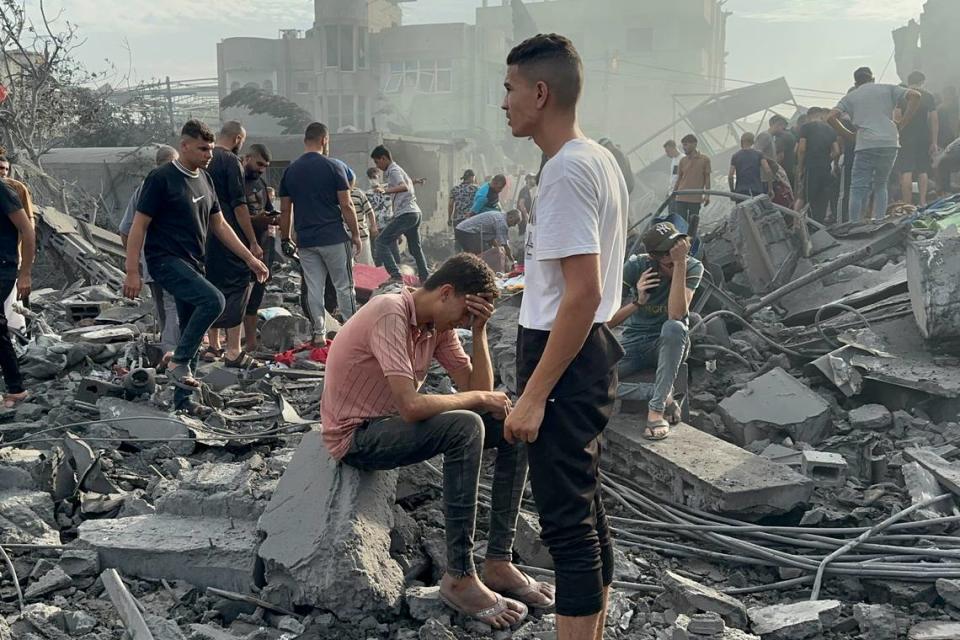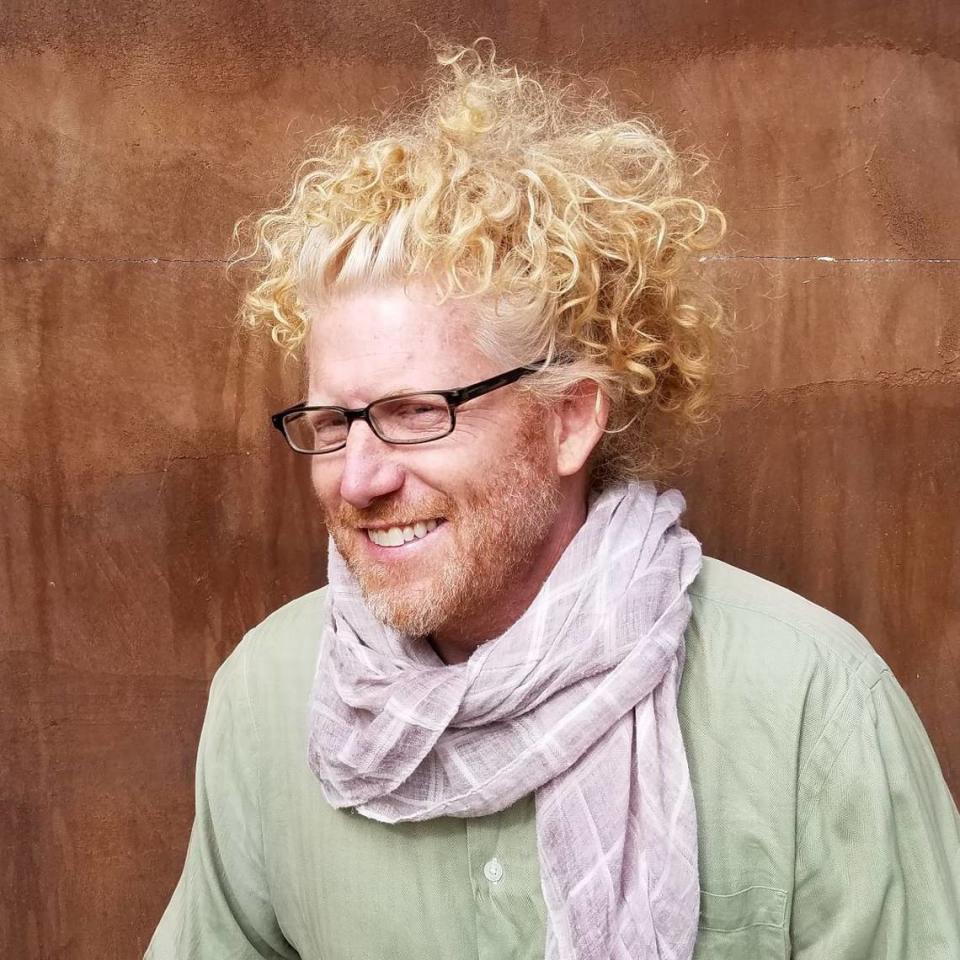How should we feel about the suffering in Gaza? Cal Poly professor weighs in | Opinion
As scenes of suffering from Gaza come across our screens each day, many people have shared their mixed emotions with me, a professor who regularly teaches about the Israeli-Palestinian conflict. As I have written previously, many people share my sentiment that Hamas deserves condemnation and every bit of military justice that Israel can muster. But what about the Gazan people?
Where does their suffering fit in the moral map of this conflict? How should we feel when innocent Gazans are caught in the crossfire of Israel’s campaign against Hamas?
As humans, it is impossible not to grieve for the people of Gaza and we all should. Images of the most vulnerable in our world—children, the elderly, and the sick—facing bombs should pull at our hearts, just as the images of massacred Israeli youth at music festival and the barbaric attacks against children and the elderly that were perpetuated by Hamas on Oct. 7.
Buddhism teaches us the importance of internalizing in the suffering of others and it indeed seems healthy to not shield ourselves from the pain of our fellow humans; Jesus in Christianity takes it a step further by modeling taking on others’ suffering. But even if we cannot aspire to such elevated ideals, we should at least feel deep compassion, which lexically means to share in the suffering of another, for the people of Gaza.
Some may say that we should not move beyond what arises in the heart and soul, but as a historian of the conflict, the mind inevitably wants to understand the origin of their suffering. Here the story is tragic, twisted, and ethically tortured. It is here where clear moral reasoning becomes clouded, as the history of Palestinian suffering reveals.
Rejection of UN partition plan
After World War II, in which the Jews of Europe faced unimaginable suffering at the hands of the Nazis, the area of Israel/Palestine was still under British control, as it had been since the Ottoman Empire collapsed in World War I. The international community sought to divide it up, with both Jews and Palestinians getting their own state and Jerusalem becoming a UN international city. Palestinians understandably, wondered why they had to give up their land when Germans were responsible for Jewish suffering. Supported by the surrounding Arab countries, Palestinians rejected the UN plan, choosing war over limited statehood.
The Palestinian Nakba, the Catastrophe in Arabic, was the result. Arab armies fought poorly, often sniping at each other as much as the public enemy, Israel. And while historical documents reveal young Israel committed some tragic and horrific massacres, Arab leaders told the Palestinian people to stay put, even as war ravaged around them, as a sign of resilience. Caught in the crossfire between Arab promises and Jewish hope for self-determination, everyday Palestinians were the victims of both sides.
After the war, Palestinian refugees streamed into the neighboring countries of Lebanon, Syria, Jordan, and Egypt. Yet, those governments made no effort to care for or integrate the Palestinian refugees. Only Jordan allowed them to become citizens. More typically, they were left to live in squalid camps, wait for revenge, and the promised triumph of a Palestinian state in the entire region, free from Jews.
Generations of Palestinians have suffered, in the longest refuge program in the history of the UN. In contrast to Jewish refugees of the same period, who were kicked out of Arab countries at the same time but were integrated into Israeli society next door, Palestinian refugees were forgotten, excluded from the dignity of being a part of Arab states.
The rise of Yassar Arafat
Eventually, Yassar Arafat emerged as the leader of the beleaguered Palestinian people. Historians like to point out that Arafat never missed an opportunity to miss an opportunity. He promised the people that Jews would all be “pushed into the sea” but during his leadership, all the remaining land in which Palestinians lived fell to Israel during a stymied Arab revenge plan that culminated in the Six Day War in 1967. Afraid of losing relevance, Arafat chose the path of terrorism, whose goal is to use violence as a means of gaining attention, with the Munich massacre of the Olympics in 1972 coming to symbolize the new Palestinian approach. Afterward, the purity of the Palestinian cause was sullied and a question mark was added to the international sympathy for Palestinians.
In the 1990s, the Oslo Accords offered a pathway to peace and statehood for the Palestinians, recognizing that nearly a half-century of struggle had only led to more suffering. But some absolutists in the region didn’t want Palestinians to ever settle, promising the people that their way would eliminate their Jewish neighbors altogether. Hamas was born, in large part, to scuttle the Oslo accords through calculated massacres of innocent Israelis.
As Hamas targeted pizza parlors and bar mitzvahs for suicide bombings, they sought to induce in everyday Israelis the same hatred that they felt. They wanted to provoke an Israeli government response that would justify their extremist rhetoric and allow them to assume the mantle of Israeli resistance. The result was the construction of a series of protective walls surrounding the Palestinian people of the West Bank, interrupting their aspirations for economic prosperity and the prospects of a contiguous state. Suicide bombings stopped but much of the West Bank became akin to an open-air prison, and everyday Palestinians suffered.
Hamas used the Israeli response to their terror as well as the rampant corruption within the political party founded by Arafat to win the first, and only, real Palestinian election in 2005. Within a couple of years, a civil war ensued between the two factions of Palestinians, with nearly 1000 Palestinians killed at the hand of their fellow Palestinian. Hamas ended up with control of Gaza and Arafat’s party Fatah controlled the West Bank, but the Palestinian people suffered in both places.
With a de-facto Hamas government mere miles from Israeli population centers, Israel instituted a blockade on Gaza, primarily to keep weapons out of the hands of a government that publicly pledged to use them to eliminate all Jews from the region. Israel knew that everyday Palestinians would suffer the effects of the blockade but security took precedence over sympathy.
Yet, we should also not overlook that the suffering of the Gazans was also strategic for Israel, who hoped that the inevitable suffering would lead to frustration by everyday Palestinians with the methods of Hamas. Perhaps the people of Gaza will one day rise up and oust Hamas, choosing prosperity over resistance. Fifteen years later, Israel needs to admit that this gambit has only hardened the hatred of Israel. The reality is most Gazans mostly blame Israel for their very real pain.
However, Hamas has also shown little interest in alleviating the suffering of the Gazan people. Hamas knows that self-determination will ultimately be won politically, not militarily. With no hope of overpowering Israel’s military — which is one of the most sophisticated in the world — their strategy is tied to convince the collective influence of the international community to force Israel to acquiesce their demands. However, to be clear, the linchpin of this gambit is images of the continued suffering of its people garnering international sympathy. Hamas sees the public sacrifice of their own population as their greatest weapon, and everyday Palestinians suffer as a result.
Hamas fears irrelevance
Hamas’ greatest fear is to fade into irrelevance. When the Palestinian cause is not in the headlines, Hamas sees itself as losing and nothing creates headlines like the innocent loss of life. Herein lies the ultimate impetus for the attacks against Israel on Oct. 7. Hamas’ primary goal was to get the world talking about Palestinian suffering again — and this goal seems to unequivocally be working. I would not be writing this column if it was not for terrorism, for example.
But the brutality of the attacks was also intended to invoke so much hurt and anger in everyday Israelis that they will support a particularly brutal episode in the cycle of revenge. For Hamas, Gazan suffering at the hands the Israeli military is strategic: poke the bear and then publicize its response is as old as human conflict itself. So Oct. 7 had to be so horrific that the voices of peace and non-violence within Israel—and there are many — could never be heard over the loud calls for vengeance.
Hamas is not horrified by the disproportionate military response by Israel, they demand it.
Hamas desperately wants this current bloody ground invasion by Israel, for only on the streets of Gaza is the battlefield asymmetry of power lessened due to their pre-installed defense network and willingness of Hamas to embed their fighters in the innocent population.
Their primary goal, however, is not to “win” the military battle, though they celebrate every Israeli military death. Rather, their goal is to coax Israel into killing civilians, publicize these casualties of war, and hope for international support. The woman and children Hamas leaders surround themselves with — the human shields — are not there to protect them but to die for them.
Innocent people of Gaza held hostage
The sad conclusion to this Palestinian version of a Kafka novel is that the people of Gaza are being held hostage on multiple fronts: by Palestinian leadership that invites innocent suffering and then promotes it as justification for their cause; by Israelis who have a hard time seeing beyond their own pain inflicted by Hamas; and by a broken international community that primarily offers Band-aids to salve the pain rather than cooperate to fix the underlying source.

So how should we feel about Gazan suffering?
The human response is clear: we should see and share in their pain, for feeling compassion toward them is a sign that our hearts have not yet hardened. However, a critical analysis of the source of their suffering yields murkier conclusions. In the end, everyday Gazans have too often been the tragic sacrificial pawn in a geopolitical game in which no one has, or likely will, win.
Whenever suffering becomes a means toward an end, it dehumanizes those who suffer. Can we all at least agree that a bit of our collective humanity dies with each innocent victim, Palestinian and Israeli? Maybe that is a start for a new path to peace.
Editor’s note: An earlier draft of this Viewpoint was published in error.


